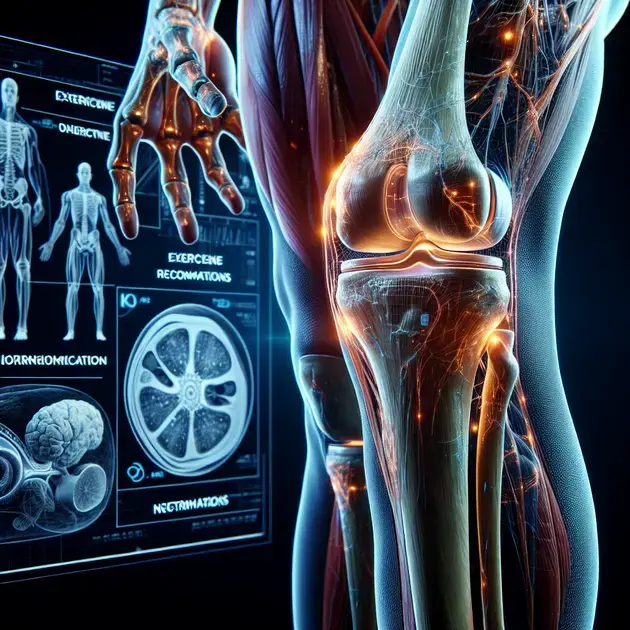The knee joint is one of the largest and most complex joints in the human body. It plays a crucial role in supporting the body’s weight and allowing for movement, making it an essential part of daily activities.
Understanding how the knee joint functions can help individuals prevent injuries and maintain optimal joint health. In this comprehensive guide, we will explore the anatomy of the knee joint, common issues that can arise, and effective ways to promote knee joint health throughout life.

**
The Anatomy of the Knee Joint Explained
**
Understanding the anatomy of the knee joint is essential for anyone looking to improve their knee health. The knee joint is a complex structure that consists of bones, ligaments, tendons, and cartilage. The main bones involved in the knee joint are the femur, tibia, and patella. These bones are held together by ligaments, such as the anterior cruciate ligament (ACL) and the posterior cruciate ligament (PCL).
One way to learn more about the anatomy of the knee joint is by using the “Complete Anatomy” app. This app provides 3D models of the human body, including detailed views of the knee joint. By exploring these models, users can visualize the different components of the knee joint and how they work together.
Additionally, websites like the American Academy of Orthopaedic Surgeons (AAOS) offer valuable resources on knee anatomy. They provide interactive tools that allow users to interact with virtual knee models, helping them understand the structures and functions of the knee joint better.
By educating yourself on the anatomy of the knee joint through resources like apps and websites, you can gain insights into how the knee works and the importance of maintaining its health.
Overall, having a good grasp of the anatomy of the knee joint can empower individuals to make informed decisions about their knee health and prevent potential issues or injuries.
**
Common Issues and Injuries Associated with the Knee Joint
**
Types of Knee Injuries
Knee injuries are common and can range from mild to severe. Some common knee issues include sprains, strains, tears in the ligaments or meniscus, and conditions like osteoarthritis. Understanding the different types of knee injuries is crucial for effective management and treatment.
Identifying Symptoms
Symptoms of knee injuries can vary but often include pain, swelling, stiffness, and difficulty bearing weight on the affected knee. It’s important to promptly address any unusual symptoms related to the knee joint to prevent further complications.
Seeking Professional Help
When experiencing knee pain or discomfort, it’s recommended to consult a healthcare professional, such as an orthopedic specialist or physical therapist. These experts can perform diagnostic tests, such as MRI scans, to accurately identify the issue and recommend appropriate treatment options.
Rehabilitation and Prevention
Rehabilitation plays a vital role in recovering from knee injuries. Following a structured physiotherapy program and engaging in exercises to strengthen the knee muscles can aid in the recovery process. Additionally, implementing preventive measures like wearing proper footwear and utilizing knee braces during physical activities can help reduce the risk of future injuries.
Long-Term Care
For individuals with chronic knee issues, long-term care and management are essential. This may involve lifestyle modifications, such as maintaining a healthy weight, practicing low-impact exercises, and attending regular follow-up appointments with healthcare providers to monitor the knee’s condition.
By understanding common knee issues and injuries, individuals can take proactive steps to safeguard their knee health and prevent potential complications in the future.
**
Effective Strategies for Maintaining Knee Joint Health
**
Regular Exercise Routine
Engaging in regular low-impact exercises, such as swimming or cycling, can help strengthen the muscles around the knee joint and improve overall mobility. Websites like “MyFitnessPal” offer workout plans specifically designed to promote knee joint health and reduce the risk of injuries.
Healthy Diet and Hydration
A balanced diet rich in nutrients like calcium, vitamin D, and omega-3 fatty acids can support bone and joint health. Incorporating foods like leafy greens, dairy products, and fatty fish into your diet can aid in maintaining strong and healthy knee joints. Apps like “MyPlate” provide personalized nutrition plans to help individuals achieve their dietary goals.
Proper Warm-Up and Cool-Down
Prior to engaging in physical activities, it’s important to warm up the muscles around the knee joint to reduce the risk of strains or sprains. Dynamic stretching exercises and light cardio can prepare the body for exercise. Similarly, incorporating a cool-down routine with static stretches can aid in muscle recovery and prevent stiffness.
Appropriate Footwear and Supportive Gear
Choosing the right footwear for different activities and utilizing supportive gear like knee sleeves or braces can provide additional stability to the knee joint. Websites like “Road Runner Sports” offer guides on selecting suitable shoes for various sports and activities, ensuring proper support and cushioning for the knees.
Regular Health Check-Ups
Scheduling periodic check-ups with a healthcare provider or orthopedic specialist can help monitor the overall health of your knees. These professionals can provide guidance on preventive measures, detect potential issues early on, and offer personalized recommendations for maintaining optimal knee joint health.
By incorporating these effective strategies into your routine, you can promote the longevity and well-being of your knee joints, enabling you to stay active and healthy for years to come.

Understanding the Functionality of the Knee Joint
The knee joint is a complex structure that plays a crucial role in supporting the body’s weight and enabling various movements. Composed of bones, ligaments, tendons, and cartilage, the knee joint allows for flexion, extension, and rotation. Understanding the functionality of the knee joint is essential for maintaining its health and preventing injuries.
When the knee joint is compromised due to factors like aging, excessive strain, or trauma, everyday activities can become challenging. It is vital to prioritize knee joint health through proper nutrition, exercise, and lifestyle choices. By taking proactive measures, individuals can support the functionality of their knee joints and promote overall well-being.
One way to maintain the functionality of the knee joint is by incorporating low-impact exercises that strengthen the surrounding muscles and improve flexibility. These exercises can help reduce the risk of knee injuries and enhance joint stability. Additionally, practicing proper form and technique during physical activities can prevent undue stress on the knee joint and minimize discomfort.
By understanding the intricate workings of the knee joint and adopting healthy habits, individuals can optimize their joint function and enjoy an active lifestyle. Prioritizing knee joint health is key to maintaining mobility, preventing pain, and promoting long-term well-being.
Nutrition Tips for Supporting Knee Joint Health
Proper nutrition plays a significant role in supporting knee joint health and overall joint function. Incorporating foods rich in essential vitamins, minerals, and antioxidants can help reduce inflammation, strengthen bones, and promote optimal joint function. Additionally, staying hydrated and maintaining a healthy weight can alleviate pressure on the knee joint and reduce the risk of discomfort.
When considering nutrition tips for supporting knee joint health, it is important to include foods that are known for their anti-inflammatory properties. Consuming a diet high in leafy greens, fatty fish, nuts, and seeds can help combat inflammation and enhance joint health. Avoiding processed foods and sugary beverages can also contribute to better joint function and mobility.
Incorporating supplements such as omega-3 fatty acids and glucosamine can provide additional support for knee joint health. These supplements have been shown to reduce inflammation, support cartilage integrity, and alleviate joint discomfort. Consulting with a healthcare provider before adding supplements to your regimen is recommended to ensure safety and effectiveness.
By prioritizing a nutritionally balanced diet and making mindful food choices, individuals can nurture their knee joints and promote long-term joint health. A holistic approach to nutrition, combined with other health-promoting practices, can contribute to strong and resilient knee joints for years to come.
Incorporating Low-Impact Exercises for Stronger Knee Joints
Low-impact exercises are beneficial for strengthening knee joints, improving flexibility, and enhancing overall joint function. These exercises are gentle on the joints while still providing a challenging workout that targets the muscles surrounding the knees. Incorporating low-impact exercises into your fitness routine can help prevent injuries, reduce joint pain, and promote better mobility.
Examples of low-impact exercises that are ideal for strengthening knee joints include swimming, cycling, yoga, and tai chi. These activities help build muscle endurance, improve balance, and increase flexibility without putting undue stress on the knees. Engaging in a variety of low-impact exercises can target different muscle groups and promote overall joint stability.
When incorporating low-impact exercises for stronger knee joints, it is essential to start gradually and listen to your body. Paying attention to proper alignment, using appropriate footwear, and modifying exercises as needed can help prevent strain and injury. Consistency is key when it comes to reaping the benefits of low-impact exercises for knee joint strength and flexibility.
By including a mix of low-impact exercises in your fitness routine, you can support the health and functionality of your knee joints. Whether you prefer gentle stretching or more dynamic movements, finding activities that work for you can lead to improved joint mobility, reduced discomfort, and enhanced overall well-being.
**
Conclusion
**
In conclusion, understanding the intricate functionality of the knee joint is paramount for maintaining its health and preventing injuries. Through proper nutrition, exercise, and lifestyle choices, individuals can proactively support their knee joint health and overall well-being. By incorporating low-impact exercises that strengthen surrounding muscles and focusing on proper form, the risk of knee injuries can be reduced, and joint stability can be enhanced.
Nutrition also plays a significant role in supporting knee joint health. By consuming foods rich in essential vitamins, minerals, and antioxidants with anti-inflammatory properties, individuals can reduce inflammation, strengthen bones, and promote optimal joint function. Additionally, staying hydrated, maintaining a healthy weight, and considering supplements like omega-3 fatty acids and glucosamine can further support knee joint health and alleviate discomfort.
When it comes to incorporating low-impact exercises for stronger knee joints, starting gradually, paying attention to alignment, and being consistent are key factors for success. Swimming, cycling, yoga, and tai chi are excellent options for building muscle endurance, improving balance, and increasing flexibility without straining the knees. By consistently engaging in a variety of low-impact exercises, individuals can enjoy improved joint mobility, reduced discomfort, and enhanced overall well-being.